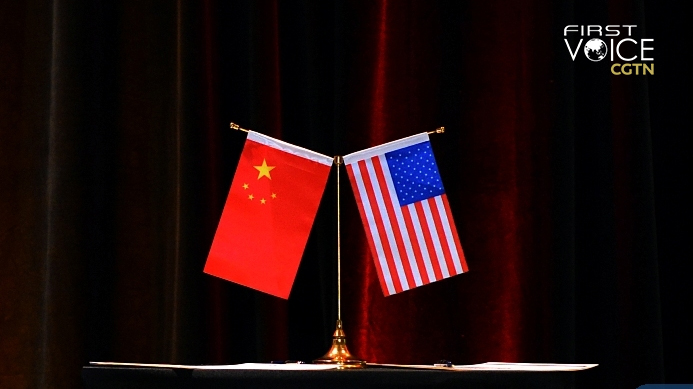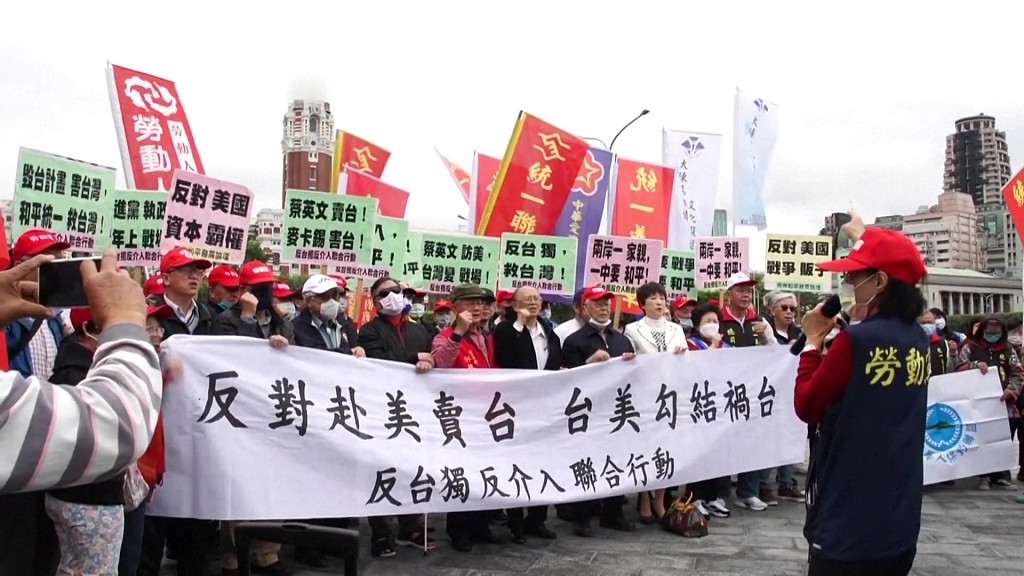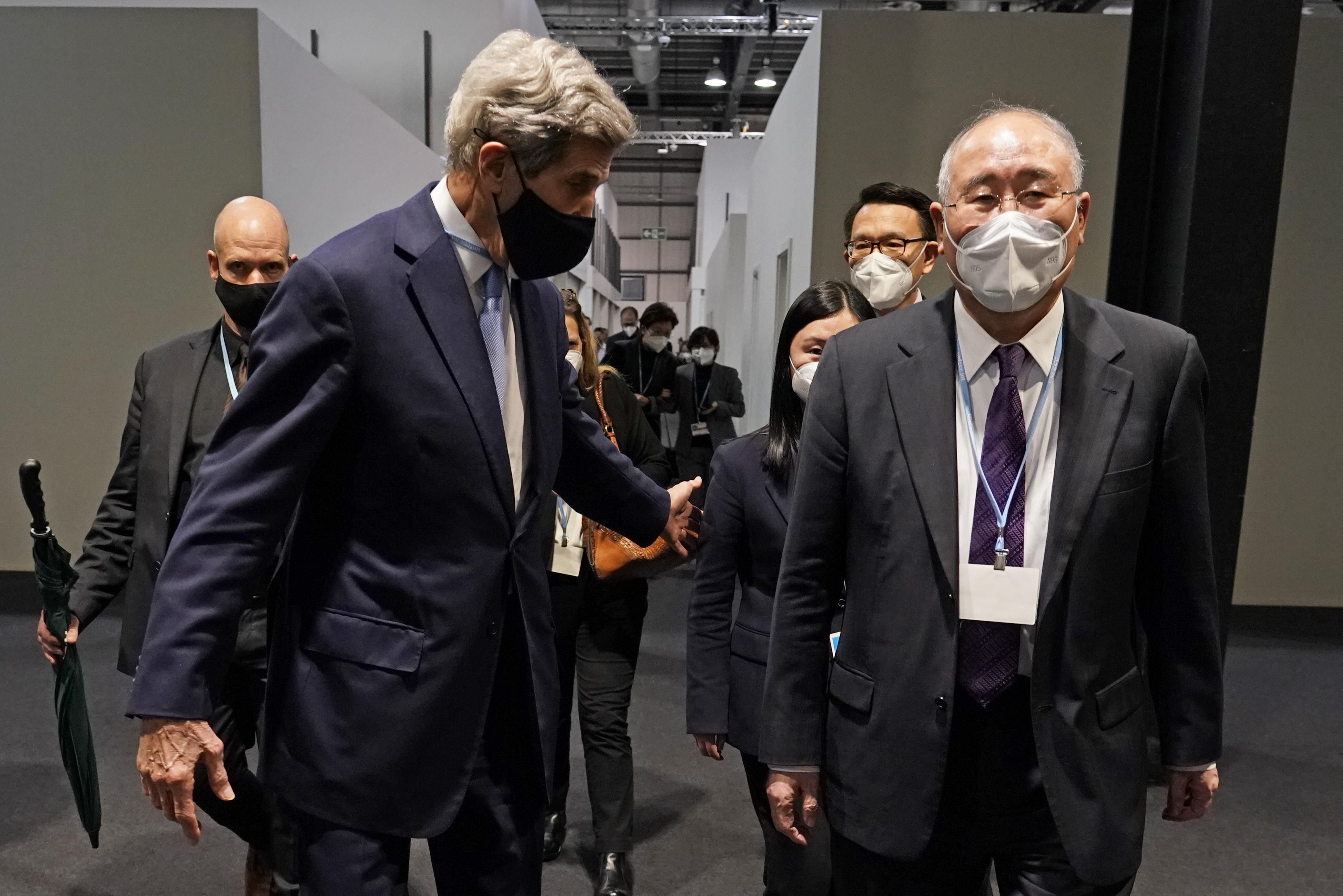
Editor's note: CGTN's First Voice provides instant commentary on breaking stories. The column clarifies emerging issues and better defines the news agenda, offering a Chinese perspective on the latest global events.
It has been a busy week in the China-U.S. relationship. On May 25, the Chinese Commerce Minister Wang Wentao met with his counterpart U.S. Commerce Secretary Gina Raimondo, with the two sides having "candid and substantive discussions" and agreeing to enhance communication. On the 26th, he met with U.S. Trade Representative Katherine Tai.
Also, China's new Ambassador to the United States Xie Feng met with U.S. Undersecretary of State for Political Affairs Victoria Nuland in Washington D.C. on May 25th. A day later, he paid a visit to the former U.S. Secretary of State Henry Kissinger in Connecticut, expressing China's best wishes on Kissinger's 100th birthday.
High-level interactions one after another seem to be signaling a warming of relationships between China and the United States after several intense months. The "balloon" incident, the reception of Taiwan leader Tsai Ing-wen by U.S. House Speaker Kevin McCarthy, the U.S.'s advance of trade talks with China's Taiwan region have been a few of the many examples that have frozen China-U.S. ties.

Demonstrators in China's Taiwan region call for peace and protest against Tsai Ing-wen's "stopover" in the U.S., Taipei, China, March 28, 2023. /CFP
Demonstrators in China's Taiwan region call for peace and protest against Tsai Ing-wen's "stopover" in the U.S., Taipei, China, March 28, 2023. /CFP
Where is this relationship going?
During his meeting with U.S. President Joe Biden in Bali, Indonesia, Chinese President Xi Jinping said that the world is big enough for the two countries to develop themselves and prosper together. "The success of China and the United States are opportunities, not challenges, for each other," he said.
According to U.S.'s data in early 2023, the China-U.S. trade in 2022 reach $690.6 billion. U.S.'s exports to China increased by $2.4 billion and imports increased by $31.8 billion. Chinese Ministry of Commerce's spokesperson said that the result fully demonstrates the high complementarity between the two countries' economic structure and shows the mutually beneficial and win-win nature of economic and trade cooperation. Together, China and the United States account for more than 40 percent of global GDP.
The China-U.S. relationship is too important for both countries and the reach is too wide in the world for the two countries to constantly battle each other. According to World Bank's assessment, the trade war between China and the United States has created fragmentation that's not just adversely impacting the two countries. "Fragmentation creates additional burdens and diseconomies of scale on exporters and multinational corporations from third countries, as companies need to adjust their products and processes to comply with different regulations," the report said.
Besides trade and business, China-U.S. cooperation is crucial in tackling global issues. On climate, the joint Glasgow Declaration on Enhancing Climate Action in the 2020s between the two countries was a major confidence boost to the world. UN Secretary-General Antonio Guterres said that it is an "important step in the right direction." U.S.-based environmental advocacy group Environmental Defense Fund described it as a "hopeful sign." Delegates in Glasgow applauded it and believed that it could have a galvanizing impact on countries to step up their games, according to the Yale School of Environment's report.

China's special envoy for climate change Xie Zhenhua, right, walks with John Kerry, United States Special Presidential Envoy for Climate at the COP26 U.N. Climate Summit in Glasgow, Scotland, Nov. 12, 2021. /AP
China's special envoy for climate change Xie Zhenhua, right, walks with John Kerry, United States Special Presidential Envoy for Climate at the COP26 U.N. Climate Summit in Glasgow, Scotland, Nov. 12, 2021. /AP
But it's been proven difficult for the United States, particularly the U.S. politicians, to accept the fact that undermining the China-U.S. relationship will not end well for their country and the world. The House of Representative's "Select Committee on the Chinese Communist Party" recently approved recommendations for Congress to impose sanctions on China's tech companies involved in "genocide" against Uygurs. And the recommendations included improving combined military training between the U.S. and China's Taiwan region and accelerating delivery of weapons to the Taiwan region. "Tough on China" remains a popular rallying cry for candidates seeking high offices in the United States.
How should China and the United States set up guardrails that prevent the relationship from being negatively affected by political fads and personal ambition will be crucial in re-shaping and re-building the bilateral relationship. As we've seen from McCarthy's meeting with Tsai and his predecessor's visit to Taiwan, a single U.S. politician's political zeal in outdoing his or her political opponents and securing a legacy for him or herself could have a detrimental impact on the overall relationships of China and the United States. These actions sow great distrust between the two countries that prevent meaningful cooperation and dialogue from taking place.
And how to clarify the competition vs. cooperation dynamic in this complicated relationship is a question that's still dividing the two. The United States have been focusing heavily on the "competition" aspect while China sees cooperation as the most beneficial way forward for the two countries. Since the overemphasis of "competition" has led to the deterioration of the China-U.S. relationship, perhaps it is time for the U.S. to give "cooperation" a try.
So, it is essential for high-level Chinese and U.S. officials to keep interacting and talking to each other. It is essential for them to make clear of each country's position and clear the air should the situation demands it. This moves the relationship forward. However, sincerity is paramount. Interaction and dialogue would be far less effective if the U.S. is conciliatory in talks but suppressing China at every turn in action.
After all, China-U.S. relationship is going to define the 21st century for better or for worse. It will shape the world that we are heading into. And in the world today, we need more dialogue and cooperation, not isolation and domination.
(If you want to contribute and have specific expertise, please contact us at opinions@cgtn.com. Follow @thouse_opinions on Twitter to discover the latest commentaries in the CGTN Opinion Section.)